BOOK REVIEW | Academics and social commentators who critique public policies in Malaysia often walk a tightrope. Dr Lim Teck Ghee is the perfect exemplar of this. His trenchant commentaries are a chronicle of the events that have shaped Malaysia spanning the tenures of three of the nation’s premiers. In my opinion, they are essential reading for every Malaysian.
With the launch of his book, “Challenging Malaysia’s Status Quo”, published by Strategic Research and Information Centre, readers can now peruse his thought-provoking ideas and brilliant commentaries.
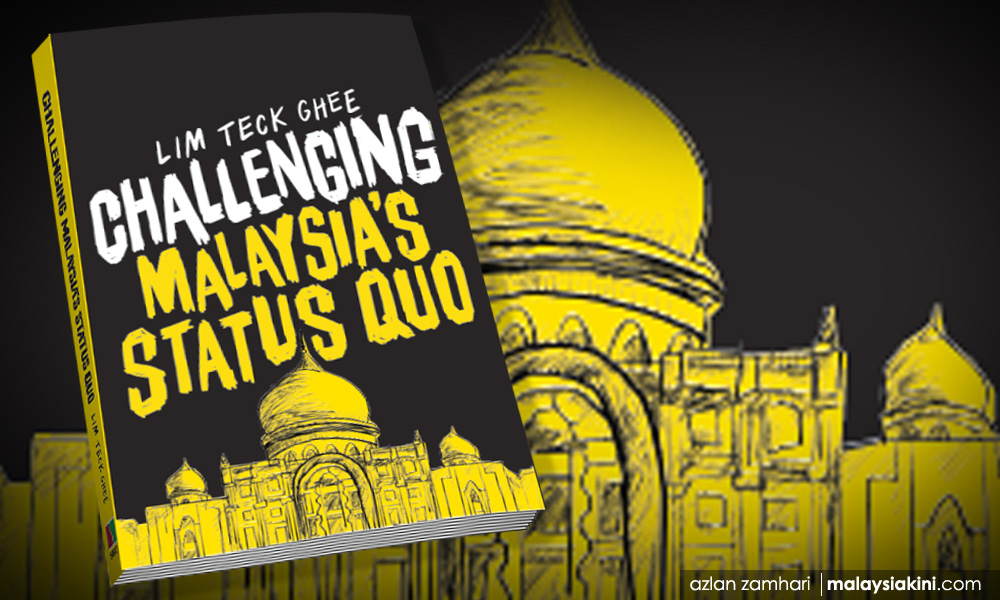
From topics on pork to jungle rats, the Almighty and atheists, tweaked statistics on crime, and Anwar Ibrahim’s acquittal - in fact, on every major subject that has troubled the nation - the erudite former university professor, like a careful clinician, has diagnosed the diseases and prescribed the cures.
He touches on almost every conceivable troubling facet of Malaysian life over recent decades. In a nutshell, the book is a synopsis of the malaise in the country - the inordinate focus on race in national planning and administration. One can’t miss the thread weaving through the various essays.
He writes in a way his readers can understand, avoiding the jargon of the ivory tower. Adroit with words and having the common touch, the prolific writer effuses genuine concern for his country in his writings. Through bridging the academia with the layperson and by edifying the reader, Lim is distinctly relevant and useful.
The collation of essays on subjects that have piqued Malaysians for a long time is a timely reminder of the abiding “‘sickness” of an ailing nation. He warns against a nation of blurred vision and skewed policies sinking into troubled waters. He hits the nail on the head with his analyses, scathing at times, yet always tempered, intelligent and consistent.
He does not waste words, or mince them, in this 500-page book.
He does not meander or try to impress but gets to the point - every editor’s delight. His choice of sub-topics for his critiques on ‘Education and history’, ‘Ethnic relations’, ‘Race-based policies’ and ‘Religion’, among others, are notable. In the dearth of intellectual and broad-range leadership in the country, his writings provide guidance.
Capturing Malaysia’s zeitgeist
Like accurate arrows, his reasoned theses strike at the heart of public concerns. He is a consummate people’s advocate. His pool of ideas could save the country planeloads of money wasted on foreign consultants who don’t understand our zeitgeist.
Don’t take my word for it, read the book, and judge for yourself.
Every writer has detractors and I’m in no doubt Lim has his fair share, even false accusers. In fact, a newspaper with a reputation for ‘fake news’ went to the extreme of demonising his website, ‘Centre of Policy Initiatives’, that publishes his writings, as a centre for ‘communists’. It goaded me to begin contributing articles to the website to defuse the slander and stand alongside the underdog.
My hope is someday Lim, who often comments on religion, may have a ‘Damascus Road’ experience that we can read about as a postlude to the interesting interview on his life the book shares. Epiphanies in religion result in personal convictions not possible from coercion or pseudo-conversion. He dwells on religion in his book from a purely professional perspective.
“The real threat to Islam is in the feverish minds of the extremists rushing to prove their ‘purer’ Islamic credentials. If they can purge themselves of these imagined furies, we will all be able to sleep more peacefully in Malaysia,” wrote Lim. It is an advice that Jakim, which has been sidelined by the Johor ruler, and other state-sponsored groups have to act on.
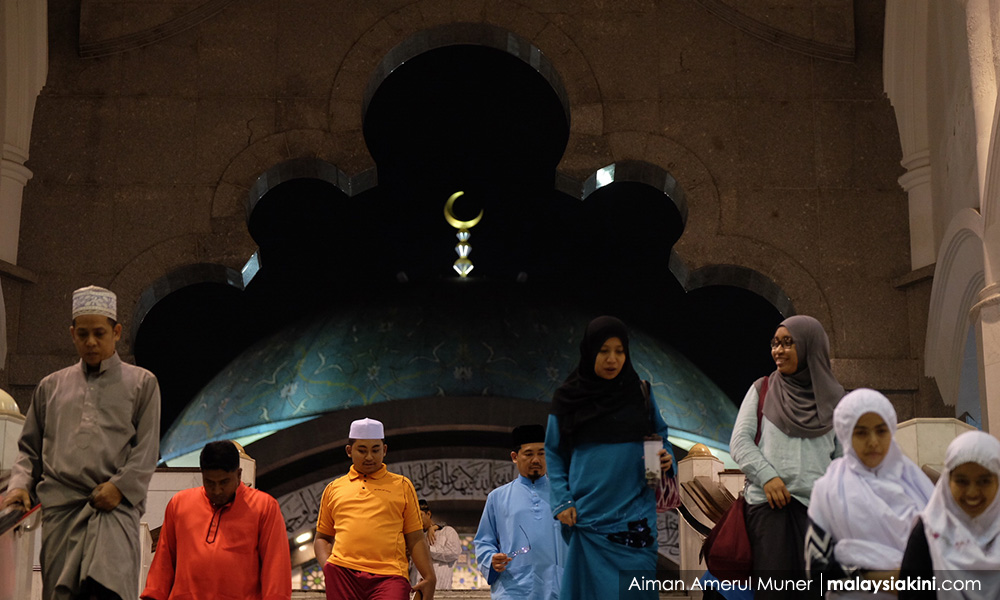
In the topic on ‘Burgeoning atheists’, Lim states a peculiar truth. On ‘Religious terrorism’, he demonstrates that no serious writer can ignore the role of religion in a nation where Islam is now facing challenges never seen before. The late Lee Kuan Yew warned that what will undo Malaysia is ‘acts of irrationality’ and Lim’s essays explore instances of such danger under ‘Religion’.
The book will not be complete without what I dub the ‘Asli incident’. History will remember the ‘monumental’ moment in 2004 when he resigned as a director of Asli (Asian Strategy and Leadership Institute) after the explosive report of his team that bumiputeras owned 45 percent, not 18.9 percent, of the country’s corporate equity, was withdrawn. While he stood by his findings, his capitulating boss did not stand by him. The article, “Lim stands by his report, quits Asli” is the official account.
Unsung hero deserving praise
The self-sacrifice of Lim’s resignation is now legendary. It is not hyperbole in a country where many place the ‘rice bowl’ before conscience and survival over sacrifice. Lim’s writings are credible because he is no impractical idealist but a realist.
In honouring the unsung hero, civil society ought to establish an annual TG Lim Award for Malaysians who sacrifice their careers for untenable reasons and under political pressure. I’m surprised no one has thought of the idea of honouring the country’s many whistleblowers and apologists of truth. It will be a symbolic win for independent research and unadulterated truth.
The country must not become the graveyard for honest minds. Minds not for sale are the best safeguard against corruption. They belong to true sons and daughters, whether now living at home or abroad. A TG Lim Award for professional integrity and excellence is not far-fetched in countering the country’s ill-repute for kleptocracy.
Would 1MDB have happened under a leader of impeccable truth-seeking like Lim demonstrates in his writings?
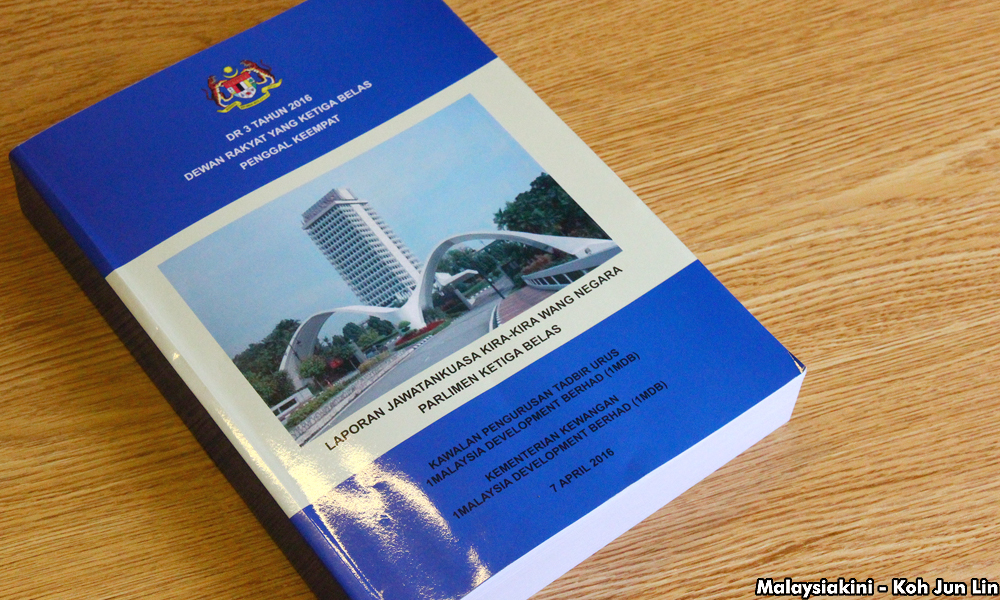
Malaysia owes an indelible debt to Lim, the paradigm of a true son, for raising the bar of professional integrity. Whether a Malay banker states ‘the NEP was bastardised’ or a Chinese complains ‘the NEP was unfair’ or an Indian moans ‘our community is marginalised’, the root is corruption.
Corruption is understood in the broader sense of the word, including not only kleptocracy but the loss of constitutional rights. Lim’s advocacy for policy reform and good public policies devoid of ethnocentricity is the only clear road to Malaysia. Sadly, the driver missed the turn.
The tag of ‘dissident activist’ pinned on Lim is somewhat of a misnomer. They did not describe the late Tunku Abdul Rahman as one when he wrote in a similar vein in his ‘As I see it’ column for The Star in the 1980s. Yet both writers displayed the love of country that only patriots can because they wrote from the heart and not just the head. The late Tunku would have approved of Lim’s ideas.
Stewards of reliable information
Writers that write to challenge are vital to a democracy, like oxygen to the lungs. In his writings, Lim is the apologist for good governance without labouring the word. He walks the talk. The issues of Bersih, Islam, Chinese loyalty, Hindraf and lots more are broached in the book of essays in his cogent, intelligible and easy-reading style.
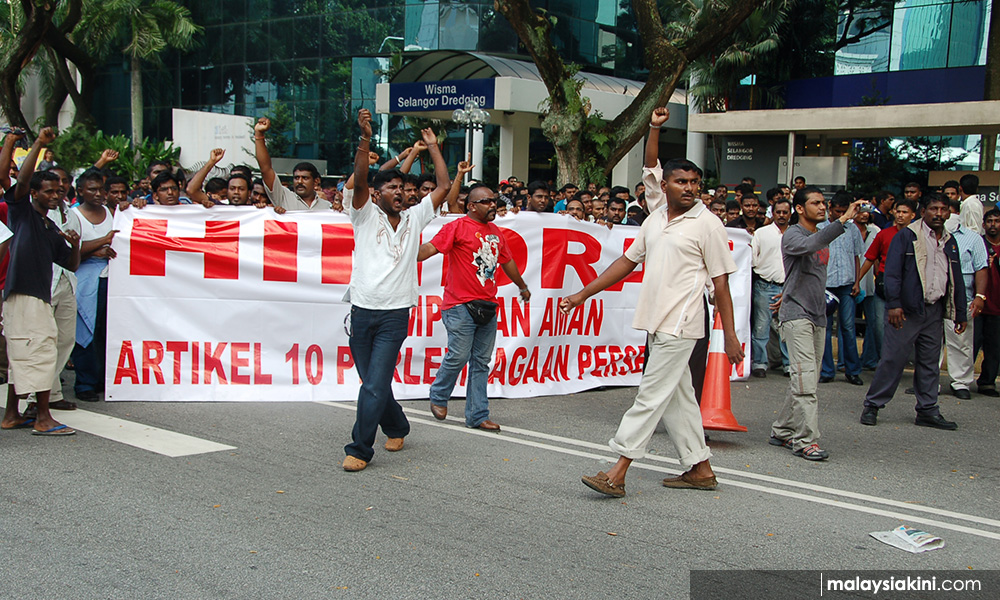
He touches on topics that are taboo or ‘sensitive’ with a clever mix of directness and diplomacy. In that regard, he is not unlike his one-time boss and mentor, the late original ‘Mr Opposition’ Tan Chee Khoon who also wrote a poignant weekly column for The Star, ‘Without fear or favour’.
It is not what writers say on a sensitive topic but how they write it that makes the difference. And the ‘gentleman scholar’ in Lim, who has a spirited way with words, like the late Tan, pulls no punches. Honest, clever, straight-to-the-point writing is credible, edifying and enjoyable to read as well because they are written skilfully with the pen of knowledge and integrity.
In the chapter ‘Guardians of the status quo’, Lim elucidates the heart of the problem threatening Malaysia’s democracy. When the various arms of government fail to perform their vital role as ‘checks and balances’ and deliver a perfunctory performance, it instigates his pen to focus on them. ‘Police impotence, Perkasa, MACC, the judiciary, media,’ among others, are not spared Lim’s scrutiny.
Writings like Lim’s count for nation-building.
They contain intelligent ideas not born out of ignorance or bigotry. The knowledgeable retired academic deals in conclusions based on empirical data, the basis for any credible thesis.
Academics are not the only stewards of reliable information but they produce more truth than political rhetoric or hype and empty slogans when one like Lim dares step into the den of wolves. Many of his writings are not simply one man’s perception but exposes of the deception.
The book contains facts that peel away the layers of deception that have kept the country in some sort of spell. But Lim is not spellbound. Instead, he breaks the spell. He dispels the false ideology that enslaves and why his writings are invaluable. No one’s education on Malaysian affairs is complete without studying his countervailing ideas on public policy and administration.
Endangered species
The incorruptible professional is an endangered species. He or she has no certain career path, no future in a corrupt environment. Yet a man of Lim’s fortitude proves you can’t keep a good man out and his stature grows with every boldly published essay. Patriots don’t need a political patron to write.
Many appreciate Lim’s stand on multitudinous issues in his book because he is unflinching. He is no armchair analyst. The man could have ensconced himself comfortably in an academic castle abroad but stayed around to face the challenges of the times in his country. His pen may yet prove mightier than the sword as he discussed in ‘Power of the pen’.
A mind not for sale is a dangerous mind to the tyrant who can only succeed with others abetting him in darkness. Corruption is moral darkness. The 1MDB imbroglio is corruption. An incorruptible mind is an anathema to the corrupt. The writings in Lim’s book project light. The light of integrity and moral darkness are incompatible. It is fortuitous for the country that he not only has a mind not for sale, but a heart in the right place.
The activist in Lim treads where angels don’t dare venture and in the book he takes on the bigots, the extremists and the political charlatans. And to prove he is not blindly ‘anti-establishment’ or partisan, he takes to task a bright opposition figure like Rafizi Ramli and academician peer Chandra Muzaffar (photo). In the book, he elucidates and expounds on their mistaken ideas. He is not reluctant to tell both sides of politics their deficiencies.
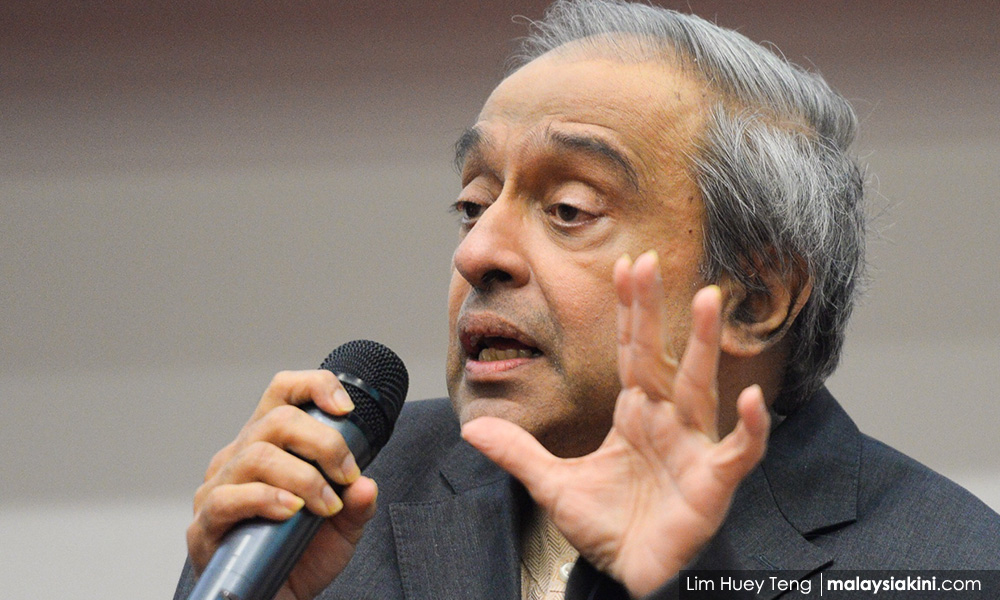
Until Malaysia swallows the bitter pill of radical reform in her major development policies, the nation faces an ultimate economic and social meltdown. No one should miss the writer’s warning. In this sense, Lim sounds like a prophet. And if the government heeds the warning as the ruler of Nineveh did, then the nation may yet avoid the looming disaster. Soon it has to face the people’s judgment in GE14.
Nation lost without moral capital
‘Challenging the Malaysian Status Quo’ reads not like a politically correct book but a book of policy corrections.
Without a healthy bank account of moral capital, no government has the ability to deliver good governance. Truth, fairness, honesty, integrity, accountability are all moral values, the foundational virtues of good governance. Writers cannot avoid moralising, in fact, life is an epic conflict of competing morals, a war between good and evil. And any government without morals does not deserve the mandate to govern.
In light of the dire predicaments that have persistently dogged the nation, Lim’s book is useful and offers pertinent solutions, though some articles were written several years ago. The topic ‘Teck Ghee’s take on the state of the nation’ is certainly worth noting.
It is a book that President Donald Trump and world leaders would want to read if they know nothing else about the ransomed nation that squandered the decades of opportunities for greatness and overlooked the pure talents in misguided notions of nationalism. Lim, like other talented Malaysians, has a destiny more profound than their country appreciates. A prophet is not recognised in his own town and that’s the problem with the mediocre state and her loss.
We saw recently a former Malaysian high achiever stand beside President Donald Trump as he announced the world’s largest semi-conductor company return their headquarters from Singapore to the US, bringing US$20 billion of revenue back to America. Proudly American, once Malaysian.
What use is a Talent Corp trying to lure back talents in the Malaysian diaspora when it does not know what to do with the inherent and exceptional talents like Lim and others in its own backyard? Why pay untold millions to so-called consultants in dubious roles? How do you develop your country’s talents and skills by hiring foreigners to do their jobs?
When all is read, many Malaysians themselves may opt for changing - and not merely challenging - the status quo. Lim did suggest the idea that a stint for the BN government in the opposition will do them good. Many will agree, as their votes indicated in GE13. After all, what’s good for BN must be good for the nation.
‘Challenging the Malaysian Status Quo’ will be launched tomorrow, Nov 8, 10.30am-1pm in Kuala Lumpur Regional Arbitration Centre Auditorium, Bangunan Sulaiman, Jalan Sultan Hishamuddin, Kuala Lumpur.
The guest of honour is Economic Council member Yong Poh Kon and the launch will be followed by a forum which will be moderated by Mohd Sheriff Mohd Kassim, G25 member and former Finance Ministry secretary-general.
Panelists include Lim Teck Ghee, Azmi Sharom, Commander (Retired) S Thayaparan and Patricia Martinez.

